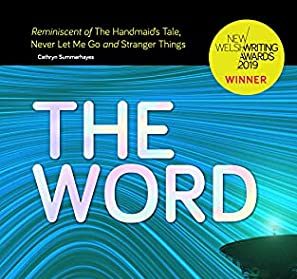Gemma Pearson reviews The Word from J. L. George, a dystopian novel which won 2019’s New Welsh Writing Award.
‘“Can you believe they used to fly planes all over the world, just so people could have strawberries in winter?’”
Since the June 2016 referendum, when the U.K. voted to leave the European Union, the state of global travel, inter-continental relations, and the cogency of our own national identity have felt uncertain and antithetic. In The Word, J. L. George’s compelling coming-of-age novel, the referendum leads to a troubling fate; Britain becomes an international pariah. Reminiscent of other speculative fiction such as Margaret Atwood’s The Handmaid’s Tale and Aldous Huxley’s Brave New World, George immerses readers in a post-truth, post-Brexit world of ceaseless war, pervasive mistrust, propaganda, and governmental control.
George’s novel, a shorter version of which won the 2019 New Welsh Writing Award, opens as two teenage boys with powerful preternatural abilities are racing to escape “The Centre.” Immediately setting up a page-turning storyline, George immerses readers into the power politics of “The Word”: the ability, borne by a handful of children in each generation, to compel other people to obey. This power, “not quite a vibration, not quite an echo, not quite a buzz, but the sense that some other voice [is speaking] alongside your own,” marks these teenagers as powerful assets to their war-mongering government. Having been studied and experimented on since they were children, Rhydian and Jonno, desperate for freedom and autonomy, go on the run.
Rhydian and Jonno are not the only teenagers with the psychic power of “The Compelling Word,” however, and as George’s narrative shifts ambitiously between perspectives and timelines, readers are introduced to a host of characters united by their individual experiences of The Word. As a result, following in the footsteps of screenwriters like the Duffer Brothers (Stranger Things) and Howard Overman (Misfits), George’s highly visual, pacey writing feels primed for television or film adaptation. George utilises the interconnected narratives of other key characters – Rachel, Irena, Cadi, and May – to paint a vivid picture of her dystopian near-future in which protestors are mesmerised into conformity and rebellion against The Centre is met with cold-blooded murder. George also ensures that these troubling potentialities feel remarkably imminent, blending classic elements of speculative fiction with current pop-culture references:
“A copy of The Sun, left behind by a previous passenger, showed a photograph of a grim-faced cabinet minister, while the headline blared dire warnings of European aggression. Above the headline, an interview with the latest Great British Bake Off winner promised all the details of a heart-breaking family tragedy.”
The Word is also infused with a certain nostalgia because, interestingly, the heightened governmental control in George’s bleak society leads to a regression in the technology available to the public: “The over head projectors had been dragged out of retirement when the school’s ailing smartboards stopped working.” Indeed, effective dystopian fiction should traverse ordinary boundaries, timelines, and worlds but, as Patrick Jones points out in his praise of The Word, it must ultimately lead readers back to one place: a reflection on the present human experience. Exploring themes of disinformation, injustice, and the lasting power of interpersonal connection, George’s writing could well stand as a vital reminder of what is important in an ever-dehumanising world of technological advancement and polarising politics.
Lastly, while the initial novella centred a “compelling story of friendship between two teenage boys” it is important to point out that Rhydian and Jonno are not merely just friends in the full-length version. Rather, their relationship is characterised by what Lloyd Markham (author of Bad Ideas\Chemicals) calls “a charming will-they-won’t-they gay teen love triangle”. Since mainstream depictions of queer relationships – particularly in writing that is not specifically about queerness – are still few and far between, it is crucial not to diminish the significance of George’s honest and tender depiction of young LGBTQIA+ love.
The Word is available now via New Welsh Review.



 Enjoyed this article? Support our writers directly by buying them a coffee and clicking this link.
Enjoyed this article? Support our writers directly by buying them a coffee and clicking this link.







